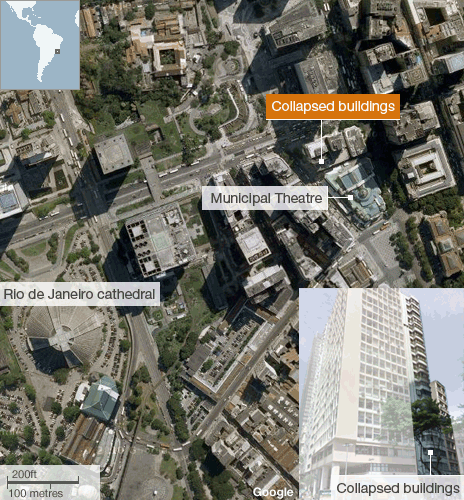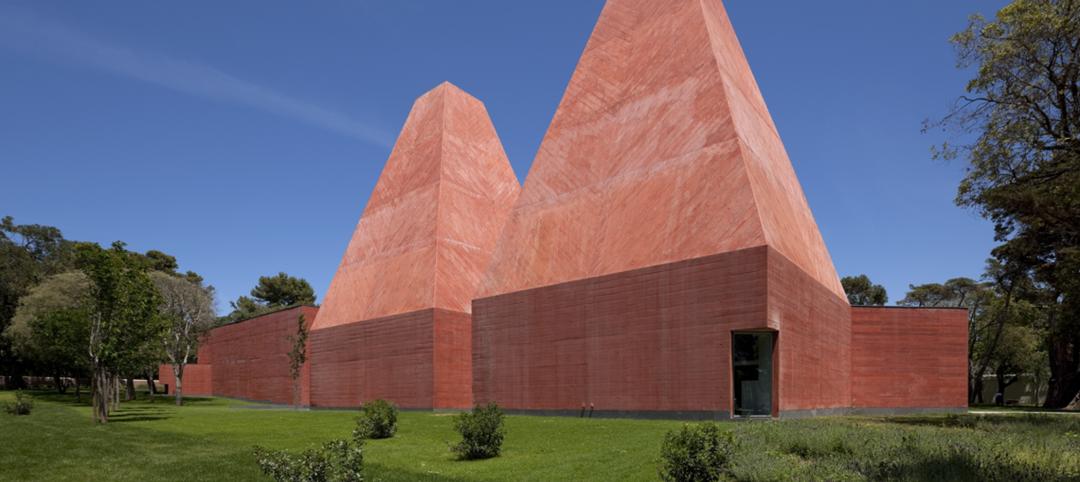RIO DE JANEIRO, Jan 26 (Reuters) - Rescuers on Thursday recovered three bodies from the rubble of three buildings that collapsed in downtown Rio, highlighting the creaky infrastructure of the city that will host the 2014 soccer World Cup and the 2016 Olympics.
The buildings, one 20 floors high, collapsed on Wednesday night in a cloud of dust and smoke just one block away from the city's historic Municipal Theater.
Rescue teams pulled six people alive from the rubble, but at least 16 people were still missing, authorities said. The buildings were mostly used for office space during the day and were almost empty at the time of the disaster.
Rio de Janeiro Mayor Eduardo Paes said the cause of the collapse could have been a structural failure caused by work being done on one of the buildings. He said there was no gas leak that could have caused an explosion.
"The work on one of the buildings could have been the cause. They could have bungled it. That's one hypothesis but it is speculation," Paes told CBN radio broadcaster. "We will investigate this fully, because it is not normal for a building to collapse," he said.
Rio is struggling to address concerns about its decrepit infrastructure, unreliable power supplies and deficient public transportation as it prepares to host global sporting events.
Construction and renovation of 12 stadiums for the soccer World Cup in 2014 is behind schedule and there is concern that Brazil's overcrowded and inefficient airports will be not able to handle masses of sports fans expected to attend the events.
The building collapses come months after an explosion apparently caused by a gas leak ripped through a restaurant in downtown Rio, killing three people and igniting more concern about the state of the city's infrastructure.
In recent months, Rio's inhabitants have had to deal with exploding sewer lines and landslides in the city's slums caused by heavy rain and deforestation.
The collapsed buildings had a bakery and an Itau Unibanco Holding bank branch on the ground floor and were near the headquarters of state-run companies such as oil giant Petrobras and development bank BNDES.
Witnesses said they heard the structures cracking and saw plaster falling before the buildings collapsed, causing panic in the streets and covering parked cars with dust and debris.
"It was like an earthquake. First some pieces of the buildings started to fall down. People started to run. And then it all fell down at once," a witness who identified himself as Gilbert told Reuters.
One man said he was on the 10th floor and ran down the stairs just in time to escape the collapse. BD+C
Related Stories
| Apr 5, 2011
Top 10 Buildings: Women in Architecture
Making selections of top buildings this week led to a surprising discovery about the representation of women in architecture, writes Tom Mallory, COO and co-founder, OpenBuildings.com. He discovered that finding female-created architecture, when excluding husband/wife teams, is extremely difficult and often the only work he came across was akin to interior design.
| Apr 5, 2011
What do Chengdu, Lagos, and Chicago have in common?
They’re all “world middleweight cities” that are likely to become regional megacities (10 million people) by 2025—along with Dongguan, Guangzhou, Hangzhou, Shenzhen, Tianjin, and Wuhan (China); Kinshasa (Democratic Republic of the Congo); Jakarta (Indonesia); Lahore (Pakistan); and Chennai (India), according to a new report from McKinsey Global Institute: “Urban World: Mapping the economic power of cities”.
| Mar 30, 2011
China's low-carbon future city
In 2005, the Chinese government announced its target to reduce energy consumption per GDP unit by 20% by the year 2010. After a multi-billion investment, that target has been reached. The Chinese Climate Protection Program’s goal to increase energy efficiency, develop renewable energies, and promote energy savings while reducing pollutant emissions and strengthening environmental protection is reflected in the “Future City” by SBA Design.
| Mar 30, 2011
Is the AEC industry at risk of losing its next generation leaders without better mentoring?
After two or three horrifying years for the AEC industry, we are finally seeing the makings of a turnaround. However, data developed by Kermit Baker as part of the AIA Work-on-the-Boards survey program indicates that between 17% and 22% of design firms are eliminating positions for interns and staff with less than six years of experience. This data suggests the industry is at risk of losing a large segment of its next generation of leaders if something isn't done to improve mentoring across the profession.
| Mar 29, 2011
City's design, transit system can ease gas costs
Some cities in the U.S. are better positioned to deal with rising gas prices than others because of their design and transit systems, according to CEOs for Cities, a Chicago-based nonprofit that works to build stronger cities. The key factor: whether residents have to drive everywhere, or have other options.
| Mar 29, 2011
Chicago’s Willis Tower to become a vertical solar farm
Chicago’s iconic Willis Tower (formerly the Sears Tower) is set to become a massive solar electric plant with the installation of a pilot solar electric glass project.
| Mar 29, 2011
Read up on Amazon.com's new green HQ
Phase IV of Amazon’s new headquarters in Seattle is nearly complete. The company has built 10 of the 11 buildings planned for its new campus in the South Lake Union neighborhood, and is on-track for a 2013 grand opening.
| Mar 29, 2011
Portuguese architect Eduardo Souto de Moura wins Pritzker Architecture Prize
Portugese architect Eduardo Souto de Moura, whose precisely-honed buildings reflect the influence of the late Chicago modernist Mies van der Rohe, is the 2011 winner of the Pritzker Architecture Prize, the field's highest honor.
| Mar 25, 2011
Qatar World Cup may feature carbon-fiber ‘clouds’
Engineers at Qatar University’s Department of Mechanical and Industrial Engineering are busy developing what they believe could act as artificial “clouds,” man-made saucer-type structures suspended over a given soccer stadium, working to shield tens of thousands of spectators from suffocating summer temperatures that regularly top 115 degrees Fahrenheit.












